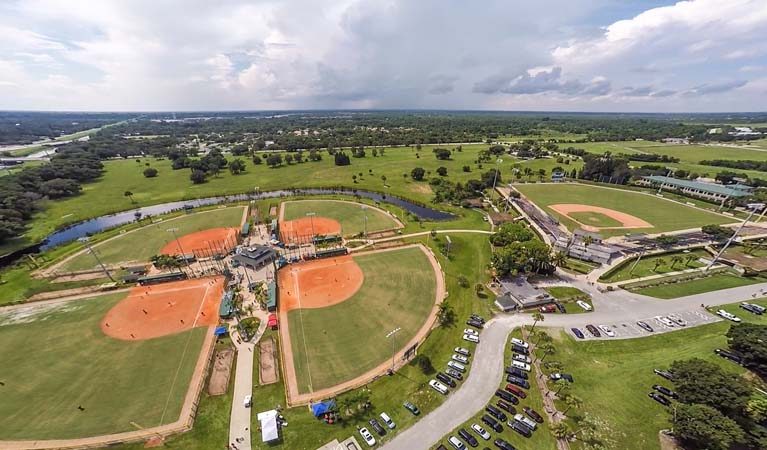
For those of us who were here when Dodgertown was our slice of baseball heaven, when Vero Beach was America’s quintessential spring-training town, the nostalgic images are forever embedded in our memories.
For many of us, the park-like confines of Dodgertown remain hallowed ground, our field of dreams, a magical place where, if we close our eyes, we still can see and feel the Dodgers of yesteryear – from Brooklyn to Los Angeles, from Jackie Robinson and Duke Snider to Sandy Koufax to Mike Piazza.
Even now, more than a decade after the Dodgers divorced us and moved their preseason headquarters to the Arizona desert, we drive past the aging complex and still sense a connection, still take comfort in knowing it’s there.
And for those selfish reasons, as much as for the positive impact its sports-related businesses have on our local economy, we celebrate the news that Major League Baseball will take over the operations of what is now “Historic Dodgertown.”
The complex had been run by Peter O’Malley since 2011, when the former Dodgers owner put together a five-way partnership to prevent the once-iconic, county-owned facility from being shuttered after the previous tenant, Minor League Baseball Inc., failed to turn a profit there.
And it was O’Malley who served as a matchmaker between the county and MLB last year. He turned 81 last week and wanted to find a fitting successor at Historic Dodgertown, where his group’s lease was set to expire April 30.
With a deal finally in place, O’Malley, whose lifelong affection for Dodgertown and Vero Beach is legend, issued a statement to express his delight.
“MLB’s plans are impressive for continuing year-round activity, while further developing and investing in the property,” he said in the statement, adding, “This long-term partnership is good news for the county and Vero Beach.”
After nearly a year of negotiations, county officials and MLB representatives last week agreed on a long-term lease that will bring much-needed repairs, desired improvements and even expansion of the campus’ facilities, with the costs shared by both parties. With three five-year options, the current lease could extend for more than 25 years.
According to Brown’s staff report to the County Commission, the county will spend $4.9 million over the next three years to do maintenance work that had been deferred because of a funding shortage during the Great Recession: replacing the roofs on most of the buildings, removing mold throughout the facility, and making repairs to the press box and concession stands.
The county also will spend up to $800,000 the first five years and up to $400,000 in subsequent years to match an estimated $10 million in improvements MLB is required to make through the first 10 years and 8 months of the lease.
The most significant of those improvements are the construction of an indoor training facility – with an artificial-turf infield, batting cages, classrooms and office space – and a renovation of Holman Stadium that includes replacing the entire seating bowl and upgrading the dugouts; installing an NCAA-approved turf baseball field; and adding outfield fences and erecting a new scoreboard.
MLB also will upgrade the on-campus hotel rooms, replacing carpet and beds, and will totally revamp the kitchen and dining areas.
“We’re going to transition to Vero Beach a number of our programs that existed elsewhere, so enhancing the facility is important to us,” said Tony Reagins, MLB’s senior vice president for youth programs. “We also plan to run some larger events there, and we’re committing the resources necessary to make that happen.
“We’re not looking to make money on this deal,” he added. “We’re working with the county to make Dodgertown a world-class facility for baseball and softball development, one that will be run at a high level and service as many groups as we can.
“For us, it’s not just a matter of bringing the MLB brand to Dodgertown. We also want to involve the local community in what we’re doing.”
Partnering with MLB was, really, the best outcome we could’ve hoped for. Certainly, it beat the alternative, which almost certainly involved shutting down a facility sorely in need of maintenance and eventually putting up a “For Sale” sign.
“There are only so many potential operators of a facility of this type,” Brown said. “Without this deal, there was a good chance we’d have seen the end of Dodgertown as a baseball complex.”
So, yeah, we got lucky.
We got lucky that we had someone like O’Malley, who cared enough about Dodgertown to rescue the facility and keep it viable the past eight years, so that there was a chance this could happen.
We got lucky that O’Malley, who used his baseball clout to acquire the more-marketable Historic Dodgertown moniker and then transformed the complex into a multi-sport facility, cared enough about the place to make sure it stayed in good hands.
We got lucky that MLB cared enough about Dodgertown’s history – Reagins said the spring-training legacy of the Dodgers and especially Jackie Robinson, baseball’s first black player, contributed mightily to MLB’s interest in the deal – to want to come here.
County officials said Historic Dodgertown’s operations have contributed $15 million annually to the local economy each of the past four years, and we can expect that number to increase now that MLB, with all its resources and a renovated campus, is running the place.
That, more than anything else, is a reason to thank O’Malley, applaud the efforts of our county officials and celebrate the arrival of MLB.
For most of us, Dodgertown is a place we go to only in our memories – but knowing baseball is still played there makes for a more pleasant trip.



